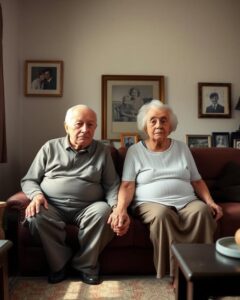My husband and I spent our lives making sacrifices—not for wealth, not for recognition, but for our three beloved children. We skipped meals so they could eat better. We wore the same old clothes so they could have new ones. We gave up vacations, hobbies, and comfort, all in the hope they would live easier, brighter lives.
We didn’t expect rewards. Just maybe a little love in return. A phone call. A visit. A moment of care.
Instead, in our final years, we found ourselves alone.
John and I had known each other since childhood. We grew up just a few houses apart, sat in the same schoolrooms. We married at eighteen in a small ceremony—nothing extravagant, but it was full of love. Just a few months later, I was pregnant. John left university and picked up two jobs to support us.
Those years were hard. Some weeks, all we had to eat were potatoes. But we never once complained. We were building a life for our children. That’s what mattered.
We had three children in total. There was never much help—no parents nearby, no siblings to rely on. I stayed home to raise the kids while John worked late shifts, often returning exhausted, his hands worn and rough from labor.
Eventually, we made it through. Slowly, with years of sacrifice and countless sleepless nights, we managed to help each child get started in life. We even bought flats for two of them. Our youngest wanted to study medicine abroad, so we took out another loan and said, “We’ll make it work.”
Then came the stillness. The kids grew up and moved away. They built families, careers, lives of their own. And just as we thought we might finally rest, John got sick.
I cared for him alone.
I called Sophie, our eldest, asking if she could visit. She said she was too busy with her own family. James, our son, claimed he couldn’t take time off work—but later posted vacation photos online. Emily, our youngest, sent a message: “I have exams, sorry.”
I didn’t expect grand gestures. I just wanted them to show they remembered. That we mattered.
John passed quietly one damp morning in November. Just me and a nurse by his side. No children, no flowers. Just the memory of a lifetime spent giving.
For days, I couldn’t bring myself to eat or even turn on the lights. The house felt heavy with silence. Every picture on the wall, every corner, reminded me of what once was.
Then something unexpected happened.
One late afternoon, a young woman knocked on my door. She’d just moved into the building. Her name was Yara. She looked uncertain, lost even, and apologized for disturbing me. I could’ve closed the door. But something made me say, “Would you like a cup of tea?”
That small moment turned into something bigger.
Yara began visiting often. We talked about everything—her work, her struggles, my memories of John. She didn’t see me as someone forgotten. She listened. She cared.
On my birthday—one my children had forgotten—Yara brought a small cake. “Happy B-Day, Nora!” it said. I cried. Not because of the cake, but because someone remembered.
Not long after, I received a message from Emily: “Sorry for being out of touch. Hope you’re okay.” It didn’t hurt like it used to. I’d stopped hoping. And in doing so, I’d found peace.
Yara and I now share dinners. Sometimes she comes by with banana bread or puzzle pieces. Other times, she just sits beside me in quiet company. She makes space for me in her life—and that has brought a kind of healing I never expected.
Last week, I found an envelope in the mail. No name, no return address. Inside was a photo—our family, years ago, on the beach. On the back, just three words: *I’m so sorry.*
Maybe it was from one of them. Maybe not. I placed it gently on the mantle, right where John used to keep his keys.
And I whispered, “It’s okay. I forgive you.”
Because now I understand something I didn’t before: **Being needed is not the same as being loved.**
We spent our lives being needed. But love… love looks like someone choosing to show up, not out of obligation, but out of kindness.
So if you’re reading this and you feel forgotten—please know this:
**Your story isn’t over.**
Sometimes love arrives in unexpected forms. It may not look like a grand reunion or a handwritten letter. It may look like a neighbor with a jigsaw puzzle, or a young woman who says yes to tea.
Keep the door open—not for who left, but for who might still walk in.
If this story moved you, consider sharing it with someone who may need a reminder that kindness still exists—and that love can grow in even the quietest places.




